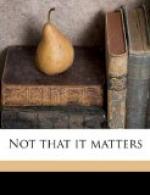How delicate are the tender shoots unfolded layer by layer. Of what, a whiteness is the last baby one of all, of what a sweetness his flavour. It is well that this should be the last rite of the meal—finis coronat opus—so that we may go straight on to the business of the pipe. Celery demands a pipe rather than a cigar, and it can be eaten better in an inn or a London tavern than in the home. Yes, and it should be eaten alone, for it is the only food which one really wants to hear oneself eat. Besides, in company one may have to consider the wants of others. Celery is not a thing to share with any man. Alone in your country inn you may call for the celery; but if you are wise you will see that no other traveller wanders into the room. Take warning from one who has learnt a lesson. One day I lunched alone at an inn, finishing with cheese and celery. Another traveller came in and lunched too. We did not speak—I was busy with my celery. From the other end of the table he reached across for the cheese. That was all right; it was the public cheese. But he also reached across for the celery—my private celery for which I owed. Foolishly—you know how one does—I had left the sweetest and crispest shoots till the last, tantalizing myself pleasantly with the thought of them. Horror! to see them snatched from me by a stranger. He realized later what he had done and apologized, but of what good is an apology in such circumstances? Yet at least the tragedy was not without its value. Now one remembers to lock the door.
Yes, I can face the winter with calm. I suppose I had forgotten what it was really like. I had been thinking of the winter as a horrid wet, dreary time fit only for professional football. Now I can see other things—crisp and sparkling days, long pleasant evenings, cheery fires. Good work shall be done this winter. Life shall be lived well. The end of the summer is not the end of the world. Here’s to October—and, waiter, some more celery.
A Christmas Number
The common joke against the Christmas number is that it is planned in July and made up in September. This enables it to be published in the middle of November and circulated in New Zealand by Christmas. If it were published in England at Christmas, New Zealand wouldn’t get it till February. Apparently it is more important that the colonies should have it punctually than that we should.




